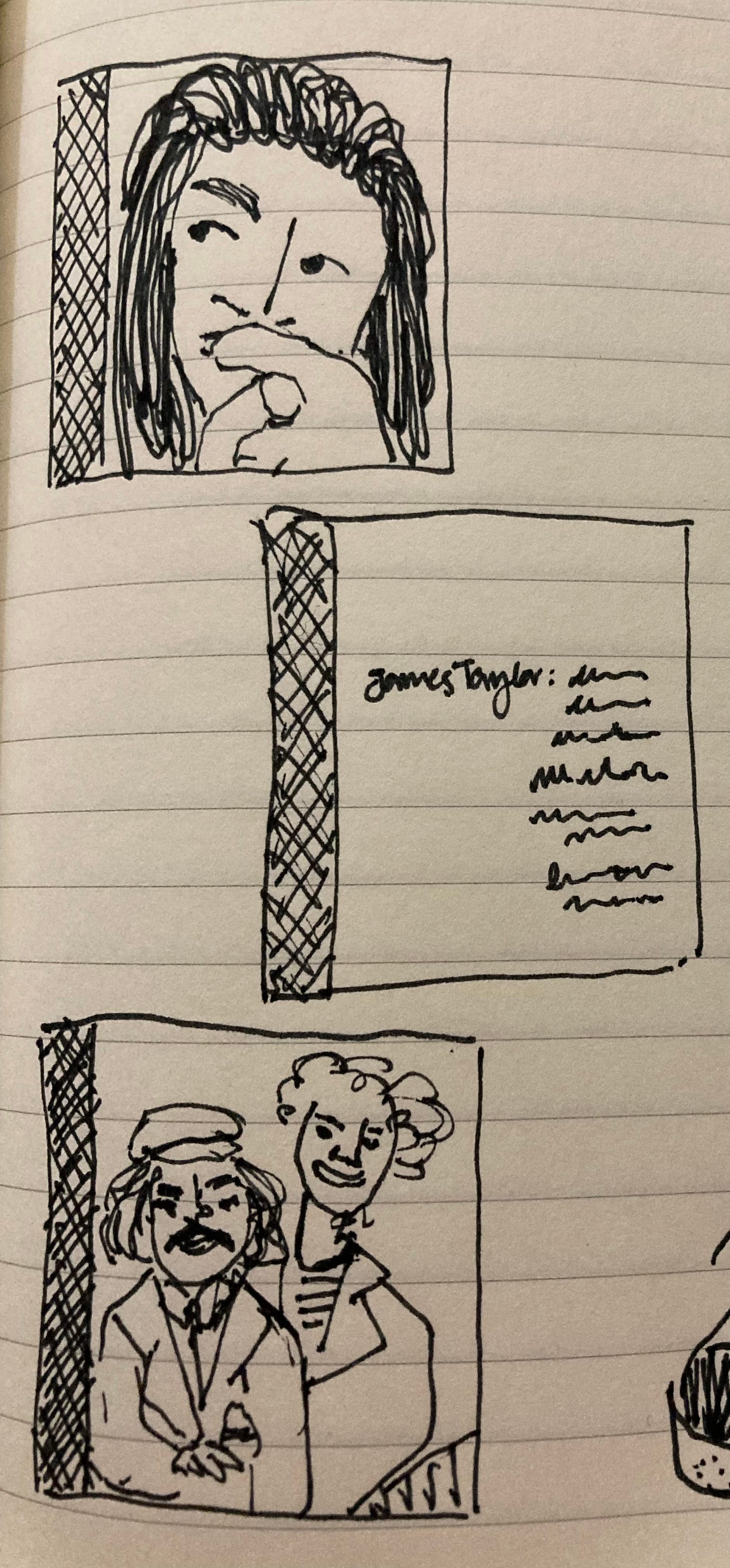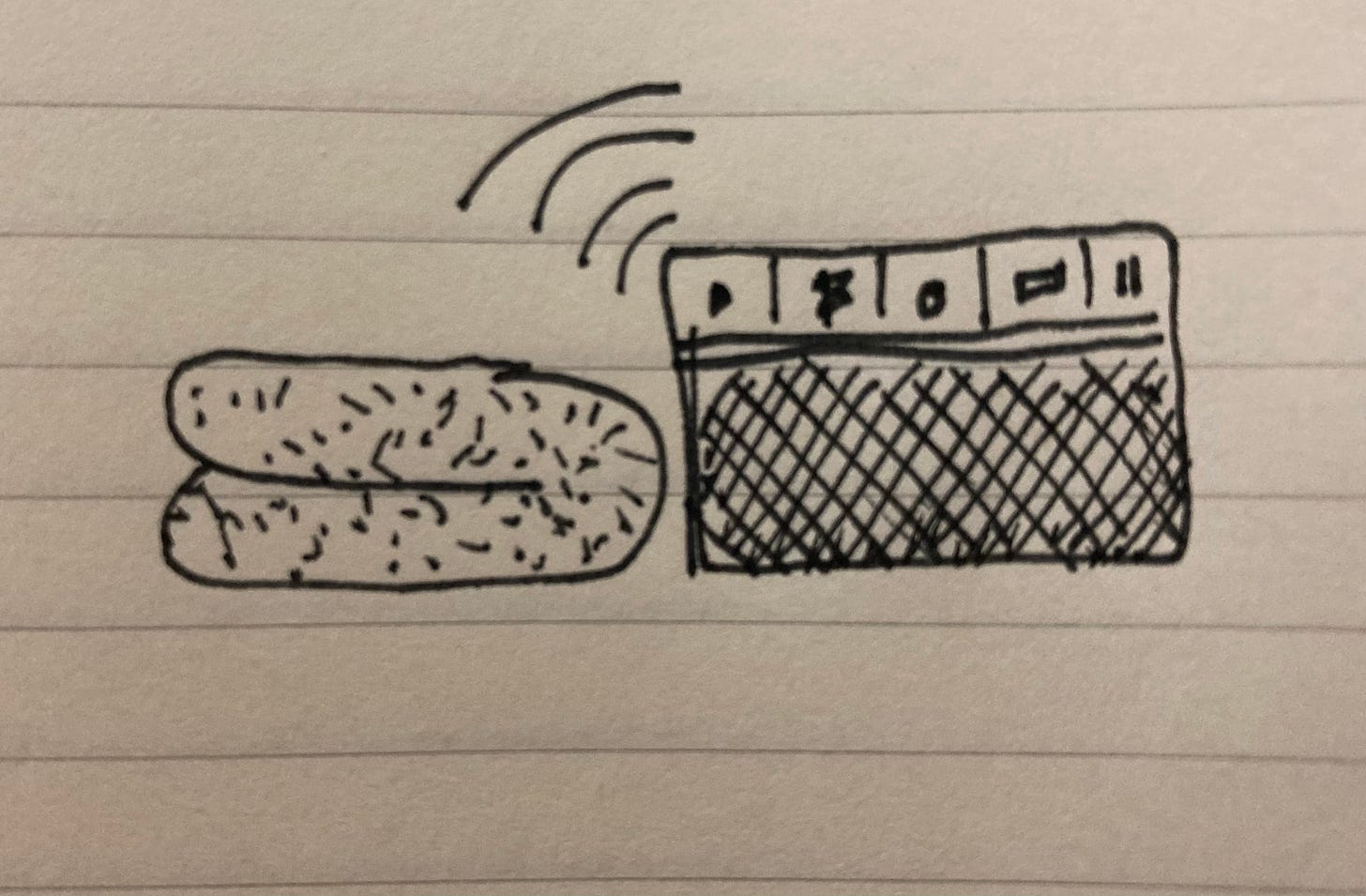A Series of Pieces of Music that Developed my Consciousness
The medium defines the method, which rings particularly true when it comes to memory-making
The songs I remember as mattering the most to me in my childhood are so intwined with the ways that I discovered them that I almost wonder if my affection for music is more tied to the paths I had to go down to find it than the quality of the music itself. Regardless of why humans such a draw to music (and other species, too— the book The Thing with Feathers does a great job of filtering complex evolutionary biology debates about dancing and music-making through a case study of viral dancing Gray African Parrots), is something I cant articulate, but I know that there was a feeling I got as a child discovering new songs that I still don’t get today. A spark of delight is still there, maybe, but none of the all-consuming, revelatory joy.
Derek and the Dominos’s “Layla” on a Ran-Over iPod Shuffle
This is perhaps the first time I can remember a song being so deeply meaningful that I listened to it on repeat until I had to detox from it. Considering that I was doing so on an iPod shuffle so crushed from a car that it only had one functioning earbud and visible wires. Not only was the physical condition of the iPod shuffle damn near unusable, but something was wrong with the actual music (I’m not entirely certain why my parents decided that it was worth taking home— it charged, somehow, but seemed only useful for listening to Layla). The fact that Layla was the only song that played, along with the fact that iPod shuffles have no way of telling what is being played, made the entire situation feel incredibly mystical, and perhaps that’s the through line for so many of these songs. There’s something special about being a kid and discovering something so new to you that you can’t fathom anyone else having lived with it and not told you. Even if it’s an Eric Clapton song.
The Carpenters’s “On Top of the World” on a Cat Music Box
When I was eight, my sister chose to have her souvenir from a trip to Australia be a music box shaped like a fat orange cat with wings (my own souvenir was a wool ski hat, which I wore even in the warm, 40 degree winters of Louisiana). The music box my sister chose was one she initially had put down, and then gotten so attached to it she begged to return to the shop to get it— another little miracle of music exposure. The soft plastic cat, with its angel wings, spun around above a cloud platform and an instrumental of the chorus of On Top of the World twinkled out. It garnered a great fondness in me, to the point that I very slowly took it from my sister. In a way, though, I think there was another sort of bittersweet delight in the discovery of what song was being played (after hours of scouring YouTube when my mom was only able to provide me with “it’s an old Carpenters song”). Discovering that the “real” song felt flat and tinny compared to the twinkling twenty seconds of its chorus instrumental was its own kind of loss, even if it introduced me to a larger truth: the version most people already knew (and what inspired some company to make a winged cat music box!). I think one of the reasons I love good covers of songs is somehow tied to this. There’s so much joy in a version that may not be the most well-known (or even the original) but manages to hold meaning for the person covering it and those who love it.
A Series of Greatest Hits CDs from My Mom’s Car
So much of the music I love comes from my parents own taste (see #4), but so much of how I processed things I love can be incredibly annoying, even if it’s a shared taste. The Best of James Taylor album my mom had in her car, for example, quickly became a banned piece of music, simply because of how much I asked for Fire and Rain to be played on repeat. The Simon and Garfunkel Greatest Hits album had a similar fate, though, truthfully, it had more issues involved in the mixing that led to its dramatic ending (on a road trip from Texas, after too many repeats and a weird difference between how loud some songs were and how soft others were, my parents agreed to get rid of the CD, which my dad accomplished by throwing it into a wedge of a crepe myrtles in a Target parking lot). Finally, a moment should be taken for the lessons of loss I learned from the hyperfixations I had fueled by my mother’s music taste. Until my dad’s best friend jokingly said “good luck with that,” leaving my father in a difficult situation that required explaining both death and melanoma, I loved Bob Marley so much that he was the celebrity who I wanted to meet the most. I don’t hold anything against my dad’s friend, for the record— partially because he was horrified when he found out I wasn’t aware of the death of a man 20 years before I was born, and partially because I think that he inadvertently has given me an anecdote that is both helpful for dinner party tight fives and philosophical reflection. I still struggle with the permanence of music and art when it combines so viscerally with the impermanence of people (watch live performances of Her’s, the indie pop band that was killed in an accident with a drunk driver and their tour bus in 2019, and you’ll struggle to comprehend that the two people making music and twitching along to it no longer exist, and haven’t for 5 years now). When you’re older, maybe it feels more real, but especially as a kid, the idea that you can listen to someone who can no longer speak, or watch someone who isn’t going about their own day somewhere, is unfathomable. Divine in its own horribleness.
My Dad’s Pandora Mixes on the Bluetooth Speaker He got Me (/Himself) for My Birthday
My father has always supported me in doing the things I love, though I think it has always been easiest for him to do so when he’s been able to filter it through his own experiences (isn’t everyone that way?). This was especially the case in the mid-2000s, when technology for listening to music was revolutionizing at an insanely fast rate. At least within my family, I’ve always been an early adopter (props to my sister, as well, who had a nook because she decided to be humble and tell my grandfather she wanted one for Christmas instead of an iPad), so I understand why part of sharing an interest in music with my father meant sharing with him technology, like the Bluetooth speaker he got for my birthday or even a pandora account. I don’t know if I recognized at the time his attempts to share with me as opposed to feeling like he was unsure how to connect, but I do know that he did a good job at letting the music take up its own space between the two of us. Often, he’d sit outside in the hallway while I took a bath as a kid, playing pandora mixes of Joan Baez (who also has many covers I prefer to their originals) and Willie Nelson. And even if I scoffed at any of it at the time, I listen now to all of it with gratitude (besides, now he’s been really into bad house music like Diplo, which is more fun to scoff at than any cheesiness Waylon and Willie were getting into in the 80s).
A General Homage to The Beatles (and the exuberance I felt for them that annoyed literally everyone in my life when I was in middle school)
The Beatles would have always gotten their own section on this list. While I cannot exactly specify why I became as moved by them as I was through middle school and ninth grade (neither of my parents were particularly super fans; my dad, in fact, disliked them because they felt “disingenuous,” though I think much of that comes from being a 70s kid who wasn’t quite listening to a lot of the anger in the songs they put out during their break up). I will say I remember the age, location, and name of the first Beatles song I remember hearing (4th grade, store in New Orleans, Hey Jude), and that the first album I ever bought with my own money was The Magical Mystery Tour. Also, on my first day of ninth grade, I wore a pair of yellow submarine high tops that made a kid ask me if I had Mike Tyson on my shoes (it was Ringo Starr). Broadly, I think that the advent of Spotify and other streaming services coincided with my own growing independence as a tween, and it opened up a wealth of new music I hadn’t ever even considered before. I hopped around from subcultures and their associated genres then, enabled by the ease of premade mixes and algorithms: twee led to mod led to punk led to new wave. It was so easy to be enthralled with these types of cultural movements, especially the older ones: the passage of time and the allowance it provided of “this was a thing” type validity provided a middle schooler who didn’t really know anything with concrete ways of presenting yourself and understanding the world around you. If earlier moments of revelatory music engagement came from feeling some Promethean individualism (no one can know how great this thing is or someone would have told me!), The Beatles signified some shift towards the revelation of how wonderful music that seemingly everyone seems to love can be. To be sure, I was still so overwhelmingly invested in pulling up all of the information I could about them that it had to have been deeply annoying, especially to my family. There was still some sort of delight in finding a new and wonderful thing: if it was so new to me, there hard to have been some parts of the music those around me didn’t know (they did). I think something that I learned from the intensity of my love for the Beatles (and honestly, propensity for the culture coming out of England broadly in the 1960s) is related to the way that the human conscience transforms affinity and earth-shattering moments over time. It’s glib, but it reminds me of a conversation I had with my mother when I asked her about if she’d ever had a supernatural experience (which will need to be another substack post later). “You know,” she said. “I don’t quite remember. I’m sure there were moments I felt crazy about then, but they all feel so normal now. Of course they happened. That’s all I need to know.” Maybe the point of all of this is to think about how, even though music doesn’t seem to shape me so intensely as it did as a child, I’ve just accepted the way good art makes me feel. The revelations life gives us in… well, everything, become normal. Maybe writing down even the bits and pieces we know happened can help bring back the way they made us feel.








